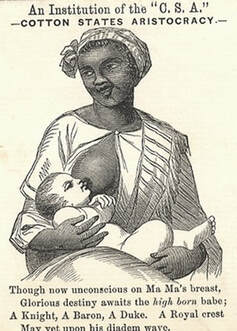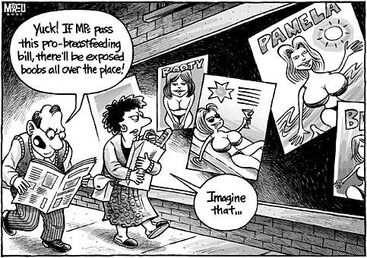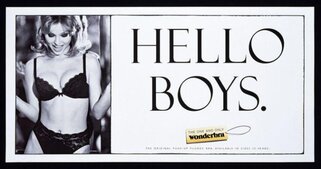 “Slave Nursing White Baby, Envelope 2,” 1861–1865. John A. McCallister Collection: Civil War Envelopes (Library Company of Philadelphia, Philadelphia, Pa.) “Slave Nursing White Baby, Envelope 2,” 1861–1865. John A. McCallister Collection: Civil War Envelopes (Library Company of Philadelphia, Philadelphia, Pa.) How we feed our babies should be a personal decision, but as women we are often not enabled, informed or respected enough when it comes to making these choices. This often leaves us sad and confused, fighting the ‘mummy wars’ instead of the structures which led us here in the first place. To some extent, groups of women have always been oppressed by the way they feed their babies and class and ethnicity have exacerbated inequalities. In eighteenth century England the reproductive labour of lower class wet nurses was exploited as they put aside their own infants in order to serve the wealthy. Whilst in America, enforced wet nursing by slave owners provided a unique form of exploitation which still impacts breastfeeding rates amongst Black American women today. Shame has long been used as a punishment for women, to keep them in their place and to preserve patriarchal order. The mum who reaches for the bottle after being told that ‘breast is best’ feels the same sense of shame as the mum who secretly feeds her 2 year old because ‘he doesn’t need it now’. Pressure to breastfeed without adequate support or accurate advice and mixed messages about feeding for long enough but not ‘too long’, with no support for weaning, leads to tensions between formula feeders and breast feeders and detracts from the real issue of the structures that bind us.  Breastfeeding-Magazine.com Breastfeeding-Magazine.com Breasts function as mammary glands but we are surrounded by messages telling us to cover up and be discreet when breastfeeding. Although protected by law, women are still shamed for exercising their right to breastfeed in public and called exhibitionists. Debates on television, in newspapers and social media insult women calling them 'lactivists' for using their own bodies as they wish. This shaming of women for breastfeeding in public, in turn limits their use of public spaces. This is in contrast to the sexualised advertising which suggests breasts exists solely for the satisfaction of men and as an indicator of attractiveness. There is no shaming of the women in the Wonderbra adverts, for that is deemed an appropriate showing of flesh. Even though much more is shown than a woman breastfeeding an infant. As women we must ask. Who is this serving? What part are we playing in keeping this status quo alive? Who is saying what is an acceptable female body? Infant feeding occurs in the context of a myriad of gender inequalities which include lack of support, the loss of traditional knowledge passed on from woman to woman over centuries, the sexualization of breasts, public aversion to breastfeeding, fewer women in public spaces, and the medicalisation of female bodies.
These issues are heightened at the intersection of multiple areas of discrimination such as ethnicity or class and gender which is demonstrated by shorter breastfeeding duration. It is time for women recognise that however they feed their babies, these structures affect them and their right to choose. To break the bias, we need to fight against a culture of shame and instead fight for support, respect and information for our bodies and our choices. Dr Lyndsay Poore with thanks to Aayesha Bhattay.
1 Comment
1/31/2024 02:36:59 am
How can the medicalization of female bodies be addressed to ensure that women's health decisions are informed by their own needs and preferences rather than external pressures?
Reply
Leave a Reply. |
AuthorMammas Peer Supporters, Mothers who use our services, Directors and our trusted friends all contribute to this blog. Archives
May 2022
Categories
All
|
Proudly powered by Weebly



 RSS Feed
RSS Feed